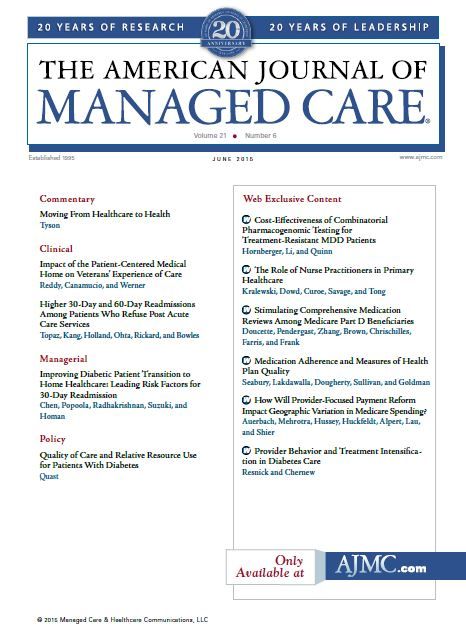- Center on Health Equity & Access
- Clinical
- Health Care Cost
- Health Care Delivery
- Insurance
- Policy
- Technology
- Value-Based Care
Moving From Healthcare to Health
Focusing on quality and quality measurements has the potential to reduce costs, increase quality, and deliver more value to patients, consumers, and customers.
the next 20.
It comes as no surprise to any reader of this journal that the last 20 years have seen healthcare in this country become less and less affordable—for families, for employers, and for the government. For those who doubt the magnitude of the issue, let me start by sharing a few statistics.
Currently, the average American family pays almost 25% of their household income for healthcare every single month—second only to what they pay for housing-related expenses. From 1999 to 2014, overall inflation increased 43%, and workers’ earnings increased 54%. During that same time, health premiums increased by 191%, and workers’ contributions to healthcare premiums increased 212%.1
Clearly, this is not sustainable—and it is not acceptable. Every one of us in the American healthcare system has an obligation to deliver greater value and affordability to the American people, to American businesses, and to our government.
When I talk about affordability across the country, one question often comes up: “How can we make healthcare affordable without sacrificing quality?” In my mind, that’s an old way of thinking, and I would suggest there is something wrong with that thought process. This is not an either-or-proposition. I strongly believe—and we are seeing—that a focus on quality and quality measurement can, in fact, reduce costs and increase quality, as well as deliver more value to patients, consumers, and customers.
First, we need to become “unstuck” from the traditional notion of healthcare and accept the reality that our healthcare system is changing, with the conversation now focusing more on health.
Historically, we have had a healthcare system that is set up to focus on the last few years of people's lives, addressing health issues after they occur, oftentimes resulting from unhealthy habits and behaviors acquired much earlier in life. We need to move to an approach that focuses on health, not just care, which means we need to push the healthcare dollars upstream through all stages of life and focus more on prevention, early detection, and early treatment, so we can maximize what I call the “healthy life” years. If we do this, we will see benefits in both quality and affordability.
We will need to consider all kinds of changes if we are going to get there. Already, we have seen the early movement away from a fee-for-service model that places incentives in the wrong places and a shift toward more of a value-based payment structure—one that focuses on outcomes instead of output. The Health Care Payment Learning and Action Network, part of HHS Secretary Burwell’s effort to partner with the private sector to make progress on this front, is gaining momentum as the group works toward testing value-based payments and alternative payment models. Simultaneously, officials recently announced that the Pioneer Accountable Care Organization program will be expanded, after the first 2 years of the program saved $384 million and also showed important quality improvements.
These examples are important steps toward focusing on value ahead of treatment. I also know we need to keep pushing so they become more than just examples of progress.
While we rethink our payment models, we also need to look at other pieces that can help drive quality and improve affordability at the same time. Technology, used correctly, offers one of the greatest opportunities we have within the industry to help us think differently about the way we coordinate and deliver care. It can arm us with data that will better inform health decisions; additionally, it can help us connect with patients more frequently and beyond the 4 walls of our facilities, meaning that care will be more convenient, more accessible, and more continuous,
while also being more affordable.
We are still on the runway as far as making healthcare affordable in this country is concerned, but the signs are promising. Organizations are placing greater emphasis—and greater financial value—on quality and quality measurement as a means to achieve affordability, and consumers are more aware than ever before of both their own health and the impact of their behavior. That combination is crucial as we work toward these big goals.
I strongly believe we will deliver on the promise of the American healthcare system defined by unparalleled quality for a cost that does not break our families, government, or employers. I am optimistic about the future, and look forward to what we will achieve collectively in the next 20 years.
As The American Journal of Managed Care celebrates its 20th anniversary, it seems fitting to look at what the last 20 years have brought us in the world of healthcare and what is likely to come in
Author Affiliations: Kaiser Permanente, Oakland, CA.
Source of Funding: None.
Author Disclosures: Mr Tyson reports no relationship or financial interest with any entity that would pose a conflict of interest with thesubject matter of this article.
Authorship Information: Concept and design; drafting of the manuscript; critical revision of the manuscript for important intellectual content.
Address correspondence to: Bernard J. Tyson, Chairman and CEO, Kaiser Foundation Hospitals and Health Plan, 1 Kaiser Plaza, Oakland, CA 94612.
REFERENCES
1. The Kaiser Family Foundation; Health Research & Educational Trust; NORC at the University of Chicago. Employer health benefits: 2014 annual survey. Kaiser Family Foundation website. http://files.kff.org/attachment/2014-employer-health-benefits-survey-full-report. Published 2014. Accessed May 2015.

Specialty and Operator Status Influence Electronic Health Record Use Variation
January 22nd 2026Operators demonstrated specialty-specific differences in electronic health record efficiency, timeliness, and after-hours use, highlighting how workflow and training shape documentation behaviors across medical disciplines.
Read More

